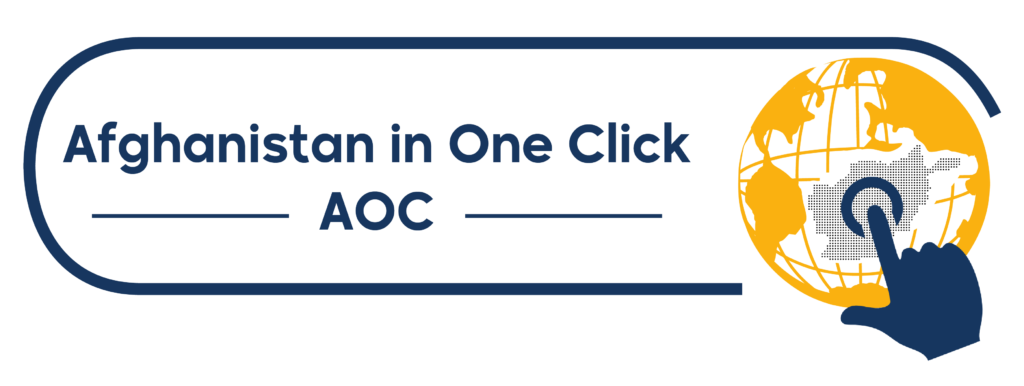The new Chinese ambassador submitted his credentials to the Taliban
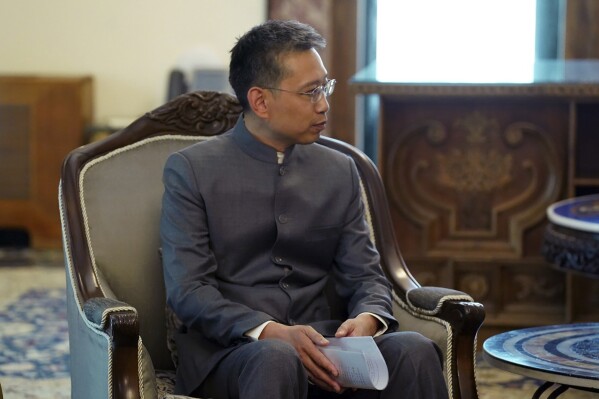 The new Chinese ambassador to Afghanistan handed over his credentials to the Taliban prime minister. According to the Taliban, he is the first ambassador of a foreign country to be introduced in an official ceremony after the Taliban returned to power.
The new Chinese ambassador to Afghanistan handed over his credentials to the Taliban prime minister. According to the Taliban, he is the first ambassador of a foreign country to be introduced in an official ceremony after the Taliban returned to power.
Taliban group has not been recognized by any country. It is not yet clear whether the introduction of Zhao Xing as the new ambassador and the handing over of his credentials to the Deputy Prime Minister of the Taliban administration is a sign of the recognition of the Taliban government or not.
Bilal Karimi, the Deputy Spokesperson of the Taliban Administration, said in a statement that Mullah Mohammad Hassan Akhund, the Prime Minister of the Taliban, accepted the credentials of Zhao Xing, the new Chinese ambassador, during an official ceremony.
Based on this announcement, the Taliban Deputy Prime Minister expressed hope that the introduction of Zhai Xing will promote diplomatic relations at a high level and start a new chapter between the two countries.
Amnesty Intl: Secondary Schools Should Be Reopened for Afghan Girls
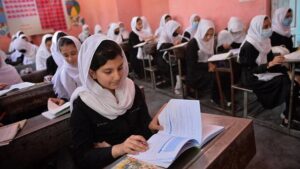 UN Secretary-General António Guterres said that September marks two years since girls were banned from attending high school in Afghanistan.
UN Secretary-General António Guterres said that September marks two years since girls were banned from attending high school in Afghanistan.
On the two-year anniversary of the ban on girls’ education in Afghanistan, Amnesty International has requested the Islamic Emirate to take immediate action to reopen secondary schools for girls.
Amnesty International added that the future and dreams of thousands of Afghan girls are at stake, and it’s been two years since the ban on girls’ access to secondary school in Afghanistan and the situation remains the same.
Monday, September 18 (27 Sonbula), two years have passed since the Islamic Emirate banned girls from attending secondary and high schools in Afghanistan.
UN Secretary-General António Guterres said that Monday marks two years since girls were banned from attending high school in Afghanistan.
Guterres added that this is an unjustifiable violation of human rights that inflicts long-lasting damage on the entire country.
The Secretary-General of the UN added that girls belong in school. “Let them back in,” Guterres said.
Two years ago today, the Islamic Emirate announced that the classes for girls above the sixth grade were closed until a “second order.”
Meanwhile, the acting minister of higher education, Neda Mohammad Nadim, said that the Islamic Emirate is not against modern science but is determined to take a better step in the field of education and with the capacity-building of universities in the country.
Speaking at a meeting in Ghor province, Nadim added that in the past twenty years, there has been much distance between religious schools and universities, and the Islamic Emirate is working to remove these distances.
In these two years, the Islamic Emirate has emphasized the need to create a solution to reopen schools and universities for girls, but so far the solution has not been universal.
Mental Health Among Afghan Women Deteriorating: UN
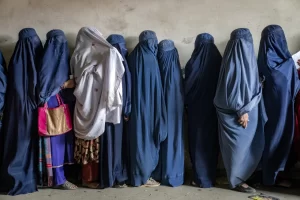 Nearly 70% reported that feelings of anxiety, isolation and depression had grown significantly worse between April and June
Nearly 70% reported that feelings of anxiety, isolation and depression had grown significantly worse between April and June
(AP) — The mental health of Afghan women, who have suffered under harsh measures imposed by the Taliban since taking power two years ago, has deteriorated across the country, according to a joint report from three U.N. agencies released Tuesday.
Nearly 70% reported that feelings of anxiety, isolation and depression had grown significantly worse between April and June, an increase from 57% in the
preceding quarter, according to the report from U.N Women, the International Organization for Migration and the United Nations Assistance Mission in Afghanistan.
Afghan women were interviewed online, in-person and in group consultations as well as via individual telesurveys. In total, 592 Afghan women across 22 of Afghanistan’s 34 provinces took part.
The Taliban, upon taking power in 2021 as U.S. and NATO forces were pulling out of the country following two decades of war, promised a more moderate rule than during their previous period in power in the 1990s. But they have instead imposed harsh measures, many of them targeting women.
They have barred women from most areas of public life and work and banned girls from going to school beyond the sixth grade. They have prohibited Afghan women from working at local and non-governmental organizations. The ban was extended to employees of the United Nations in April.
Opportunities to study continued to shrink as community-based education by international organizations was banned and home-based schooling initiatives were regularly shut down by the de facto authorities — a term use by the U.N. for the Taliban government.
Afghanistan is the only country in the world with restrictions on female education and the rights of Afghan women and children are on the agenda of the United Nations General Assembly in New York.
Taliban spokesmen were not immediately available to comment on the report Tuesday, but in the past Taliban officials have cited Shariah, or Islamic, law to support their policies regarding women and girls.
Last month, Mohammad Sadiq Akif, the spokesman for the Taliban’s Ministry of Vice and Virtue, said that women lose value if men can see their uncovered faces in public.
The report found that 81% of women had not engaged at all with local Taliban authorities on issues important to them between April and June 2023. This finding was consistent with engagement levels in the previous quarter, said the report.
Forty-six percent of women said international recognition of the Taliban government should not happen under any circumstances, while 50% warned that recognition should only occur under specific conditions contingent on improving women’s rights. These include restoring education and employment and forming an inclusive government.
The women expressed concern that recognition would only encourage the Taliban government to continue becoming stricter in their policies and practices against women and girls.
Key trade crossing between Afghanistan and Pakistan reopens after 9 days
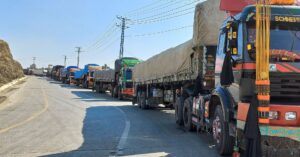 Torkham, the main land border crossing between Afghanistan and Pakistan, reopened after a nine-day closure following a deadly clash between the two countries.
Torkham, the main land border crossing between Afghanistan and Pakistan, reopened after a nine-day closure following a deadly clash between the two countries.
Pakistan shut the border after a gunfire exchange on September 6 that killed at least eight people and injured over 20 others on both sides.
The closure stifled Afghanistan’s exports to Pakistan with hundreds of vehicles stranded, costing traders millions of dollars. Many fruit and vegetable cargos were left to rot due to no cold storage facilities. Others were turned back and sold at half or lower prices in the local markets in Jalalabad.
Thousands of civilians, including children and the elderly, were also stranded on both sides, many of whom were forced to return home due to heat and lack of accommodation. Among them were Afghan families who were trying to seek medical treatment in Pakistani hospitals.
Islamabad blamed the Taliban group for building an “unlawful” construction near the crossing while the caretaker government denied the accusation, saying they were only repairing an old security outpost when Pakistani forces opened fire.
The border crossing reopened on Friday after Amir Khan Muttaqi, the Taliban’s Foreign Minister, met with Pakistan’s Charge affair in Kabul the day before.
Tens of thousands of unfortunate Afghan refugees receive temporary legal status in the United States
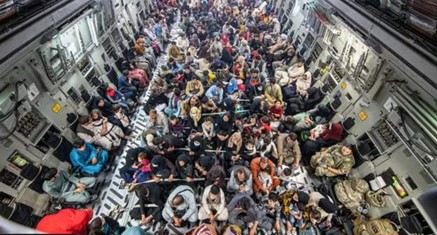 The US President Joe Biden’s government has given many Afghan citizens who have been evacuated from that country under special conditions, another 18 months to live in that country, which does not mean receiving permanent residence in the US.
The US President Joe Biden’s government has given many Afghan citizens who have been evacuated from that country under special conditions, another 18 months to live in that country, which does not mean receiving permanent residence in the US.
According to the announcement of the US Department of Homeland Security, this decision includes 74,000 Afghan refugees who were transferred to this country during the rescue operation.
Officials of the US Immigration Department have said that the Afghans who worked with the US forces in Afghanistan and were transferred to this country after the rescue operation, have received two-year residence visas, which does not mean that they have access to a green card and permanent residence in that country.
The US Department of Homeland Security has said that it will take years for these Afghan citizens to obtain US citizenship.
Advisers to the US Congress have lobbied to pass legislation called the Afghanistan Adjustment Act, which would offer Afghans in the US a fast track to permanent residency and citizenship.
Some have expressed concern that a temporary status determination, such as the one issued, would hurt the law’s chances of passage.
According to the New York Times, “Among the Afghans who have already arrived, the Department of Homeland Security estimates that only about 40 percent of them will qualify for special immigrant visas because they work for the United States in Afghanistan.”
The sudden arrival of a large number of evacuees has caused a delay in dealing with these cases in the administrative process of this country.
According to the new American decision, 60% of Afghan citizens who were transferred to this country in an emergency process, are included in the law that they have the right to live in the United States in an emergency situation. According to reports, a large number of Afghans have been rescued in the rescue operation of America and its allies from Afghanistan, and it was difficult to establish their work record in an emergency situation.
Shared in a meeting, the United Nations examines "gender apartheid" against women in Afghanistan
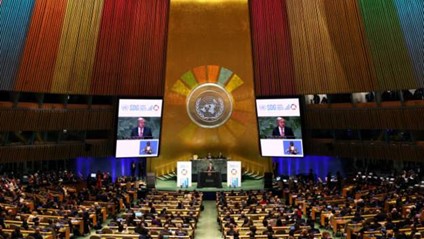 The United Nations has announced that on 22th September, will hold a meeting on the fight against gender apartheid, the status of women in Afghanistan, with the participation of representatives of various countries and international human rights organizations.
The United Nations has announced that on 22th September, will hold a meeting on the fight against gender apartheid, the status of women in Afghanistan, with the participation of representatives of various countries and international human rights organizations.
This is the first time that the United Nations has officially used the term “gender apartheid” regarding the situation of women and girls in Afghanistan.
The meeting is regarding the situation of women in Afghanistan under Taliban rule will be held in cooperation with the Permanent Mission of Afghanistan to the United Nations and the representatives of South Africa, Malta and the Republic of Dominica.
The issue of restrictions on the rights of women and girls in Afghanistan was the focus of several UN meetings this week, and it is going to be emphasized at the UN General Assembly meeting next week.
Three days ago, the foreign ministers of 12 European countries expressed concern over what they called the Taliban’s “systematic discrimination” against women.
The United Nations has recently published two new reports on Afghanistan; A survey of Afghan women and a report on “widespread torture” of detainees.
A recent UN survey found that by 62 percent, Taliban orders are enforced on women with “increasing severity,” pushing them out of the public sphere.
According to the findings of this institution, the application of restrictions by the Taliban group in the eastern provinces of this country has been more severe and without exception, “91 percent” of women interviewed in these areas said that the application of restrictions has become “very severe” and “increasing” with the passage of time. Zabihullah Mujahid, the spokesman of the caretaker government, rejected these reports and called them “propaganda” and propaganda against the Taliban group.
Prime Minister of Qatar: I told the leader of the Taliban in Kandahar to become a modern Muslim country like Qatar
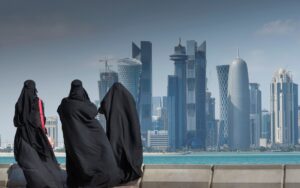 The Prime Minister of Qatar says that in the meeting with the leader of the Taliban group in Kandahar, he was told “very clearly” to become a modern Islamic country like Qatar. This is the first meeting of the Taliban group leader with a foreign official.
The Prime Minister of Qatar says that in the meeting with the leader of the Taliban group in Kandahar, he was told “very clearly” to become a modern Islamic country like Qatar. This is the first meeting of the Taliban group leader with a foreign official.
In an exclusive interview with CNN’s Christine Amanpour, Mohammad bin Abdulrahman al-Thani spoke about his trip to Kandahar, the Taliban leader’s headquarters, apparently in May, to “change his mind about women’s education and work.”
He said that he told Hebatullah Akhundzadeh that “if you want to be a part of the international community, it is necessary to cooperate with us and in cooperation, you will become a modern Islamic country like Qatar”.
He added that he explained to the Taliban group leader that, as an example, “Qatar is an Islamic country where women are allowed and proudly participate in society and are in the leadership of the country, such as ministers and ambassadors, at all levels of work and higher education alongside men.
The leader of the Taliban appointed a council of Sunni scholars for the Shiite provinces
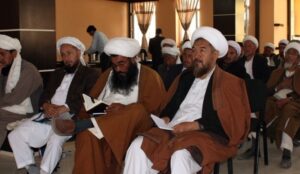 Hebatullah Akhundzadeh, the leader of the Taliban group, announced the members of the Ulama Councils of Bamyan, Daikundi, Sarpol, Maidan Wardak, Ghor and Nuristan provinces. According to sources in Bamyan province, which is mainly inhabited by Shiites, none of the Shiite clerics are present in the council of scholars of this province.
Hebatullah Akhundzadeh, the leader of the Taliban group, announced the members of the Ulama Councils of Bamyan, Daikundi, Sarpol, Maidan Wardak, Ghor and Nuristan provinces. According to sources in Bamyan province, which is mainly inhabited by Shiites, none of the Shiite clerics are present in the council of scholars of this province.
The provinces of Bamyan, Daikundi, Ghor, Sarpol and Maidan Wardak are mostly Shiites, or the number of Shiites in these provinces is significant.
Ulama councils have a consultative and supervisory function and are part of the Taliban government structure.
In a statement published by Zabihullah Mujahid, the spokesman of the Taliban group, it has been said that the provincial authorities are obliged to follow the advice of the Ulama councils.
A source from Bamyan, who asked not to be named in the report, told the BBC that in the initial list sent from Kandahar to Hebatullah Akhundzadeh, the names of Shia clerics were included: be Shia, because the province is mainly Shia”.
According to this source, after the decision of the Shia clerics and Abdullah Sarhadi, the Taliban governor for Bamyan, “a specific list of Shia and Sunni scholars was sent to Kandahar, but in the list issued by the Taliban leader, the name of no Shia cleric can be seen.” In Daikundi province, according to what the spokesperson of the Taliban government published, the name of no Shia cleric can be seen.
According to a source from Daikundi province, “About four months ago, forms were distributed among 25 Shiite clerics and 15 Sunni clerics to hold an election among the clerics of this province and send the election result to the Taliban group leader. In the proposed list that was sent to Hebatullah Akhundzadeh, the names of 25 Shiite clerics were included. But in the announcement published by Hebatullah Akhundzadeh, no Shia cleric is present.”
Earlier, the lack of a Shia cleric in the Ulama Council of Ghazni Province was also criticized. In the previous government, in the parliamentary elections, all 11 representatives who voted were Shiites.
Sources in the Shia Ulama Council of Afghanistan say that Shiites are present in 22 provinces of the country, and there are significant numbers of Shiites in provinces such as Kabul, Balkh, Herat, Bamyan, Daikundi, Kandahar, Uruzgan, and Ghor.
At the beginning of the Taliban government, the Shiites had at least three demands: the officialaization of the Shiite religion, the implementation of the law on personal status in the courts, and the recruitment of Shiite cadres at the middle and high levels of the Taliban government. All three demands of the Shiites were practically and officially implemented in the previous government. But none of these has been done under the Taliban regime.
Another desire of the Shiites was to play a role in drafting the constitution of the Taliban government. Recently, the caretaker government has announced that the work on the constitution of the Taliban group is going on under the leadership of the Taliban judge, Abdul Hakim Haqqani.
According to Shiite sources, none of the clerics and representatives of Shiites are involved in writing this law. Shiites under Taliban rule are facing an unprecedented situation because in the past two years, the Shiite religion has lost its official status, the law on the personal status of Shiites is practically not invoked in the courts, the teaching of Shiite jurisprudence has been removed from universities, and there are restrictions on holding Shia religious ceremonies have been established.
Over 800 Afghan Refugees Detained in Pakistan in 1 Week
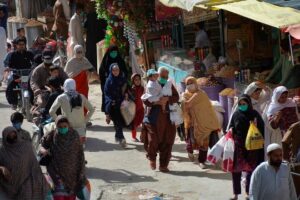 The Islamic Emirate meanwhile called on Pakistan to treat the Afghan refugees well.
The Islamic Emirate meanwhile called on Pakistan to treat the Afghan refugees well.
The consulate of the Islamic Emirate in Karachi, Abdul Jabar Takhari, said that more than 800 Afghan refugees including children have been detained in Sindh province of Pakistan within one week.
The detention of the Afghan refugees comes as the Pakistan Prime Minister said that a new policy was going into effect based on which foreign nationals without legal documents will be deported.
“The detentions are being continued and those who have documents, they have also been detained and they have released some of the Afghans with legal documents for money,” Takhari said.
Meanwhile, the Afghan refugees in Pakistan reported mistreatment by Pakistani police, and they called on the Afghan government to take immediate action in this regard.
“There is no doubt there are now detentions in Karachi, Quetta, Chitral and Peshawar as well as other areas. In Islamabad they came with men and women police and conducted a crackdown on the fruit market and detained some people,” said Mir Ahmad Rauf, head of an Afghan refugee’s council in Pakistan.
“The detention of the refugees has been increasing day by day and they are facing problems,” said Abdul Basir Wisal, an Afghan refugee in Pakistan.
“This issue needs serious negotiations and I think the central government of Afghanistan has an important role in this regard. They need to travel to Pakistan to discuss why this issue has risen and how it can be solved,” said Tahir Khan, a Pakistani journalist.
The caretaker government meanwhile called on Pakistan to treat the Afghan refugees well.
“We want Pakistan to have normal engagement with the refugees because Pakistan and Afghanistan have a lot in common. There is a lot of commuting and also there are some related issues along the Durand Line,” said Zabiullah Mujahid, Taliban group Spokesman.
The Afghan refugees have repeatedly voiced concern over their mistreatment by Pakistani police.
Pakistan's interim prime minister called for Kabul's "cooperation" against the Pakistani Taliban
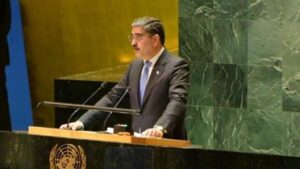 The interim prime minister of Pakistan asked for Kabul’s cooperation in taking decisive steps against the Pakistani Taliban.
The interim prime minister of Pakistan asked for Kabul’s cooperation in taking decisive steps against the Pakistani Taliban.
Anwar Haq Kakar said in the UN General Assembly that he wants the Afghan Taliban group to cooperate with this country to prevent attacks by Pakistani Taliban militants.
He has called the fight against these groups that carry out attacks in this country “Pakistan’s main priority”.
The interim prime minister of Pakistan had previously said that “Afghans without documents should be returned to their country immediately”, that “Pakistan is not a place for foreigners”.
Lately, Pakistani police have arrested hundreds of Afghans in Sindh and Islamabad for their residence documents. Some lawyers of these asylum seekers have said that among them, those who had proof of residence in Pakistan were also arrested.
Officials in Islamabad say members of Tehreek-e-Taliban Pakistan have sanctuaries in Afghanistan, but the Afghan Taliban has denied it and says it does not allow the use of Afghan soil against Pakistan.
John Kirby, US National Security Council spokesman, said that Washington does not have a plan to recognize the current Afghan government
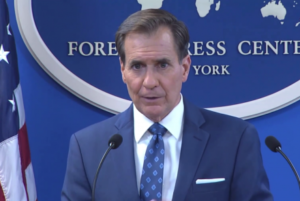 Speaking at the press conference,Kirby noted that the al-Qaida threat is vastly diminished and unlikely to return in Afghanistan, and the US is keeping an eye on other terrorist networks.
Speaking at the press conference,Kirby noted that the al-Qaida threat is vastly diminished and unlikely to return in Afghanistan, and the US is keeping an eye on other terrorist networks.
“We have not recognized the Taliban. There are no plans to do that at this point. If they want to be seen as legitimate, then they need to legitimately meet the commitments they made to the international community about how they would govern, particularly when it comes to the treatment of women and girls. And they have not only not done that, they’ve gone the other way. So there’s no plans right now to recognize the Taliban. And as for any threat of terrorism, I think you saw the intelligence community make a statement a week or so ago that certainly the al-Qaida threat is vastly, vastly diminished and unlikely to return in Afghanistan. We’re keeping an eye, of course, on other terrorist networks that could use ungoverned spaces there and elsewhere,” John Kirby said.
Referring to the matter of recognition, Bilal Karimi, the Deputy Spokesman of the Islamic Emirate said that currently Afghanistan has official relations with many countries.
Karimi once again pledged that Afghanistan’s territory is not a threat to any country.
“Afghanistan holds a special and official position, and it has official relations and interactions with different world countries. The Islamic Emirate respects and supports the rights of all people inside the country,” Karimi said.
According to some political analysts, in order to solve issues in the way of interaction between the Islamic Emirate and the international community, a consultative Loya Jirga should be held.
“We hope that a consultative Loya Jirga will be held in which the representatives of all the organizations of the world will participate, so that we can find solutions for the problems that we have in the area of interacting with the world,” said Moin Gul Samkanai, a political analyst.
“We should accept the UN charter, rules and standards and proceed based on them, then the international community will pay special attention to the people of Afghanistan,” said Mohammad Salim Paigir, a political analyst.
Over two years have passed since the Islamic Emirate came to power, but so far, including neighboring countries, no nation has recognized it.
Solar Power Project in Kabul Begins, Projected to Produce Ten Megawatts
 Baradar said that the investment field is available for investors and a special committee has been created to facilitate their work.
Baradar said that the investment field is available for investors and a special committee has been created to facilitate their work.
Mullah Abdul Ghani Baradar, the Deputy Prime Minister for Economic Affairs, inaugurated a 10-megawatt solar power generation project worth $6.5 million in the Surobi district of Kabul near Band Naghlu.
Also, his office said online that the Islamic Emirate decided to give the contract for the completion of the next 500-KW transmission line project from Turkmenistan to the Afghan Invest Company in exchange for a mining concession. This initiative is expected to facilitate the transfer of hundreds of megawatts of electricity to Afghanistan, resulting in annual savings of $200 million.
At the opening of the project, Baradar said that the investment field is available for investors and a special committee has been created to facilitate their work.
A private company has invested in this project.
“Given the significance of electricity, the caretaker government has decided to award the contract for completion of the remaining work of the 500-KW Turkmenistan electricity line project to the Afghan Invest company in exchange for a mine. This will serve as the foundation for the transfer of hundreds of megawatts of electricity to the country,” Baradar said.
Meanwhile, Abdul Latif Mansour, the acting Minister of Energy and Water (MoEW), said during the opening ceremony that following the completion of the Surobi project, work on the producing of ten megawatts of electricity will begin in Tarakhel of Kabul.
“The company will invest more than $6.5 million in this project, and when this project is operational and its electricity is connected, then we will give this company that capital, or in exchange for this investment, we will hand over a mine to it,” said Abdul Latif Mansour, Deputy of MoEW.
According to the Ministry of Energy and Water (MoEW), Afghanistan has the ability to produce 222,000 megawatts of solar energy, and there are now six big solar power producing projects in the nation.
Islamic Emirate Increasing Efforts to Raise Chabahar Port Activity
 Meanwhile, the Chamber of Commerce and Investment also said that by solving the challenges in Chabahar port, Officials in the Islamic Emirate said that they have increased their efforts to develop the activity of Iran’s Chabahar port with the aim of not harming the merchants of the country and not relying on a single transit route.
Meanwhile, the Chamber of Commerce and Investment also said that by solving the challenges in Chabahar port, Officials in the Islamic Emirate said that they have increased their efforts to develop the activity of Iran’s Chabahar port with the aim of not harming the merchants of the country and not relying on a single transit route.
Zabiullah Mujahid, spokesman for theTaliban group, emphasized that with the increase of the capacity in Chabahar port and the activation of the railway of the route with Afghanistan, the problems of the merchants will be solved to a large extent.
“We are trying to prevent losses to our traders. Our traders should not rely on one country, one path, and one way. Chabahar is active now,” said a spokesman for the Taliban group.
“Our intention is good, friendly relations based on economic benefits and good neighborliness,” said Akhond Salam Jawad, a spokesman of the Ministry of Industry and Commerce.
Meanwhile, the Chamber of Commerce and Investment also said that by solving the challenges in Chabahar port, Afghanistan’s international trade and transit process will be further developed.
“In order to resolve the technical issues of Chabahar, the government of the Taliban caretaker should act as soon as possible so that we have an alternative way…,” said Khan Mohammad Sarfraz, an official of the Chamber of Commerce and Investment.
“Chabahar port is very important to reach the markets of India exclusively and also the transit of Indian goods through Afghanistan to Central Asia. But, unfortunately, during the last twenty years, sufficient port equipment has not been installed there,” said Azrakhsh Hafizi, a political analyst.
Earlier, the officials of the Afghanistan Railway Department announced that the Chabahar-Nimroz railway project would be completed as soon as possible and they described this project one of the fundamental priorities of the department for the development of trade and transit and to facilitate the transportation of commercial goods between Kabul and Tehran.
Efforts Underway to Create New Crossing with Turkmenistan
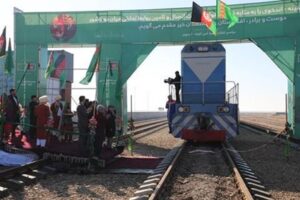 The Islamic Emirate said it plans to establish a new transit crossing with Turkmenistan through the Bala Murghab District of Badghis Province.
The Islamic Emirate said it plans to establish a new transit crossing with Turkmenistan through the Bala Murghab District of Badghis Province.
The caretaker government spokesperson, Zabihullah Mujahid, said that the purpose of creating this new route is to facilitate the export and import of goods.
Mujahid noted that the construction cost of this route has been determined and efforts are underway to implement it.
“We planned a new route to connect with Turkmenistan via the Bala Murghab. The work is underway, and the project has been determined. We are talking to the companies to sign contracts with them regarding its construction, and its practical work will begin,” the spokesperson said.
The Ministry of Borders and Tribes said that, in accordance with the Afghanistan government leader’s order, the ministry had carefully inspected the areas of this new crossing in Bala Murghab and sought the opinions of the local people on the matter.
“Noori and his delegation observed and carefully inspected this area. They also paid close attention to what people wanted. The report will also be shared with the Amir al-Mu’minin,” said Hamdullah Fitrat, spokesperson of the ministry.
The Afghanistan Chamber of Commerce and Investment (ACCI) said he considers the establishment of a new route and transit crossing with Turkmenistan as beneficial for the development of the country’s trade and economy.
“The port that will be constructed in Bala Murghab will be the best port. Both oil and flour can come through that port. We want the necessary things to be installed and built in this port as soon as possible,” said Mohammad Yunus Momand, the head of ACCI.
“The port needs to have facilities, services, and infrastructure. It should build its capabilities. We welcome this and will cooperate with the caretaker government in the construction of this port,” said Khanjan Alkozi, a member of the ACCI.
There are already two operational ports with Turkmenistan, at Aqina port in Faryab and Turghandi port in Herat.
25 Projects Worth Around 6 Billion Afs Approved
 The Taliban group Spokesman, Zabiullah Mujahid, meanwhile said that the projects will be implemented in various provinces.
The Taliban group Spokesman, Zabiullah Mujahid, meanwhile said that the projects will be implemented in various provinces.
The National Procurement Commission has approved 25 projects worth around 6 billion Afs.
The deputy Prime minister for Economic Affairs said on X that the projects are under the general directorate of the PM’s office and Ministries of Defense, Higher Education, Public Works, Rural Rehabilitation and Development, and the Bank-e-Millie Afghan and Kabul Municipality.
The caretaker government Spokesman, Zabiullah Mujahid, meanwhile said that the projects will be implemented in various provinces.
“These are various projects in different provinces which will help reduce the rate of unemployment. Our citizens will find work and everyone will be busy with work. And this is also a positive step for reconstruction of the country,” he said.
The economists believe that there should be foreign investment in infrastructure projects in Afghanistan.
“Foreign investment in infrastructure projects can be beneficial. The countries who are facing financial issues should be helped with foreign assistance,” said Mir Shikib Mir, an economist.
“Foreign investment is important to launch work on projects such as CASA-1000, TAPI pipeline plus mining as well as agricultural,” said Seyar Qureshi, an economist.
This comes as the residents of Kabul voiced concern over the high rate of unemployment.
“These projects which are worth six billion Afs are important and a good step, ” said Qudratulah, a resident of Kabul.
We are very happy about these projects. We hope these projects will be increased so that the Afghan youth will find jobs,” said Rustam, a resident of Kabul.
Earlier, the Ministry of Public Work (MoPW) said that work on 90 projects worth 2 billion Afs have begun in the ongoing solar year.
Online Business Increases in Kabul, But So Does Criticism
 Meanwhile, some sellers in the capital complain about the lack of a market for their goods.
Meanwhile, some sellers in the capital complain about the lack of a market for their goods.
Big and small online commerce has progressed recently in Kabul for a variety of Afghan-made goods.
Zainuddin, who has been running an online store for almost two years, said that although the online market is a new phenomenon in the country, his business is booming.
“The online market is a very new phenomenon, and most people are not familiar with it, but now it has become very good. It has been almost one and a half years since I have an Instagram site and the sales are good.
Meanwhile, some sellers who sell items online said they have customers from outside the country as well.
“Our sales are also outside Afghanistan — Australia, America, and Europe — and their feedback is also good,” said Barish.
“We also receive online orders, we have more orders from Germany, America, and Canada,” said Ismayil, a seller.
Meanwhile, a number of citizens of the country consider it easy to have online shopping, but they said that some of their orders are not high quality.
“Several times when I bought something online, for example, I bought a watch, the quality was very different from what I bought in person, and I was not satisfied,” said Abdul Hadi, a Kabul resident.
Meanwhile, some sellers in the capital complain about the lack of a market for their goods.
Contracts Signed for Extraction of 10 Mines in Uruzgan
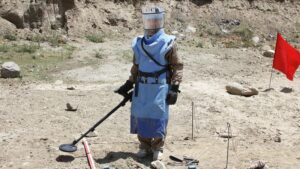 According to the governor, the contract for the extraction of ten fluoride and turquoise mines in the center and in four districts of the province will be given to some private companies, which will provide work for hundreds of people.
According to the governor, the contract for the extraction of ten fluoride and turquoise mines in the center and in four districts of the province will be given to some private companies, which will provide work for hundreds of people.
“There are contracts signed for 10 mines in Uruzgan province, these mines have been entrusted to companies with large contracts, and we have been assured that the mining work will begin soon,” said Mohammad Aali Jan Ahmed.
The residents of Uruzgan want the authorities to spend part of the money earned from the extraction of these mines on development projects in the province.
“These people have suffered a lot, now it’s time to pay attention to them,” said Sayed Wali Sediqi, a lecturer.
“Until now, there have been many people in Uruzgan province who are suffering from unemployment in one sector, in one department, they should be given attention, and the field of work should be provided for them,” said Ghulam Nabi Shuja, an Uruzgan resident.
According to the information of officials in Uruzgan, it is expected that the contract for the extraction of two fluoride mines in the Gizab district of the province will soon be signed by the Ministry of Mines and Petroleum with private companies.
Around 1,000 Foreign Tourists Entered Via Kunduz in Past Year
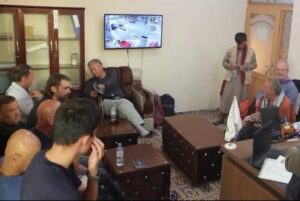 At the same time, some tourists who come to visit the country’s historical places expressed their satisfaction with security in the country.
At the same time, some tourists who come to visit the country’s historical places expressed their satisfaction with security in the country.
Local officials of Kunduz said that these tourists from various European, and Asian countries as well as from the US, have come to Afghanistan to see historical and recreational places, and tourist attractions, especially the cultural ones, and the natural landscapes of Afghanistan, including the Wakhan in Badakhshan.
“In the past year, about 1,000 tourists from different countries of the world such as the US, Europe, and Asia have come to our dear country through Sher Khan port,” said Obaidullah Abidi, a consular officer of the Kunduz Foreign Department.
At the same time, some tourists who come to visit the country’s historical places expressed their satisfaction with security in the country.
“We visit Kunduz city and we will travel up to Ehkashim and Wakhan and the reason we want to go to Wakhan is its very beautiful mountains and the people are very friendly,” said Itmes, a tourist.
“I come from India, and I am the only Indian in this group, and I am so excited about this trip, India has a good friendship with Afghanistan, and there is a lot of common culture,” said Vihai, a tourist.
“Visiting Wakhan is one of my major targets, the reason is that Wakhan has lots of beautiful natural landscapes and Wakhan is very rich in history,” said a tourist.
Exhibition Held in Herat Showcasing Small Companies Helping IDPs
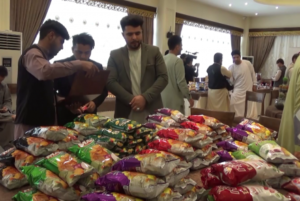 People who have been trained in the program said it is beneficial for the scope of their business.
People who have been trained in the program said it is beneficial for the scope of their business.
An exhibition in Herat backed by an organization called Cordaid International was held to promote small companies that provide work for internally displaced persons.
Forty officials of small companies in Herat have received business training from the institute in order to develop their business.
“The main goal of the project is to create employment and provide work opportunities for the internally displaced youth,” said Zalmai Esar, a local official of Cordaid.
People who have been trained in the program said it is beneficial for the scope of their business.
“Our way of doing business was going on in a traditional way, but by learning new lessons, we can conduct our business in a modern way. It was very effective for women and there were great elements that we benefited from,” said Lena Rawofi, an official of a small company.
“It has really positive effects and we can make progress and good activities through the project,” said Safiullah Ziae, a trader.
Hundreds of displaced people are reportedly employed in these small production companies.
Meanwhile, business training helps the managers of these companies to progress in their work and to hire more employees.
” We see a number of women who have been supported and have progressed and even reached the point where they export to neighboring countries,” said Behnaz Saljoqi, head of Women’s Commerce and Industry for the western region.
“In competitive conditions, it is very valuable and useful to implement such programs for the presence of people who are engaged in business,” said Hamedullah Khadem, head of the Chamber of Industry and Mines in Herat.
Drivers Voice Frustration Over Continued Blockage of Kabul-Jalalabad Road
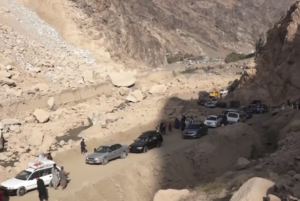 The Kabul-Jalalabad highway was blocked on Sunday after major rockslides blocked the highway in the Pul-e-Charkhi area of Kabul.
The Kabul-Jalalabad highway was blocked on Sunday after major rockslides blocked the highway in the Pul-e-Charkhi area of Kabul.
Drivers and passengers voiced their frustration over the continued blockage of Kabul-Jalalabad highway, and called on the interim government officials to reopen the highway as soon as possible.
The Kabul-Jalalabad highway was blocked on Sunday after major rockslides blocked the highway in the Pul-e-Charkhi area of Kabul.
The Ministry of Defense earlier announced on social media that the engineering teams of the ministry have created a side road on the Kabul-Jalalabad highway, and now the side road is temporarily open for traffic.
But the citizens said that the substitute path has caused them to reach their destination late due to heavy traffic jams.
“It was 7:00 in the morning that I traveled, and I wanted to go to Logar. It is now 3:00 o’clock and we are still stranded in a traffic jam. The road is in severe condition on both sides,” said Hafizullah, a passenger.
“This is not the work of one or two days. This (Kabul-Jalalabad highway) is a transit path. The caretaker government should construct it and provide facilities for the people,” said Sayed Bismil, a driver.
Meanwhile, the Afghanistan Chamber of Commerce and Investment (ACCI) said that the traders have also been facing severe challenges in transporting their commodities.
“It is an unexpected incident. We hope this will be solved soon. We were carrying grapes, melons and vegetables from Kabul. This blockage has really caused us problems and the traders have suffered from it,” said Khanjan Alokozai, a member of the ACCI.
Haqshinas told TOLOnews on Thursday that the rocks are still falling down the mountain and have covered the highway, and that whenever the sliding stops the ministry will clean the highway.
“The substitute path which has been constructed by the MoPW doesn’t have the capacity for big trucks, we want the drivers of big trucks to use the Lata band path or road of Tagab district of Kapisa province,” he said.
Retired Kabul University Professor Sells Clothes on Street to Survive
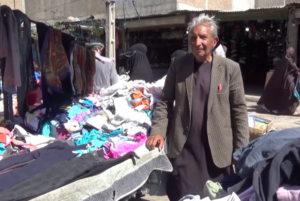 Abdul Qayum Khajazada taught at the Faculty of Science of Kabul University for 35 years and retired during the previous government.
Abdul Qayum Khajazada taught at the Faculty of Science of Kabul University for 35 years and retired during the previous government.
A retired professor at Kabul University has been forced to sell second-hand goods at the side of the road in Herat city because his pension has not been paid.
Abdul Qayum Khajazada taught at the Faculty of Science of Kabul University for 35 years and retired during the previous government.
He said that he has to sell clothes on the streets in order to support his family of six members.
“I retired at the age of 65. Because the pension is not being paid right now and my children are hungry, I had to turn to selling things, especially second-hand things,” Khajazada said.
“Specialists and academics play an essential role in the growth of society and their needs should be taken seriously. But unfortunately, recently, many people were forced to do hard labor because their pensions are not being paid, and this issue can increase their vulnerability,” said Sayed Ashraf Sadat, civil rights activist.
Abdul Qayum Khajazada has worked in the Presidential Palace and Afghanistan’s National Radio and Television for several years in addition to teaching at the university.
“He has helped the society and the students, members of the society,” said Hamza, a student.
“When we see that our teachers have left their jobs, and do not have the desire to teach at universities, we cannot do our duty,” said Ramin, another student.
The economic problems in society have gotten worse during the last two years as a result of the rise of unemployment and poverty.
Abdul Qayum Khajazada asked the Islamic Emirate to pay the salaries of all retirees in the country.
National Museum Displays Afghanistan's Historical Treasures
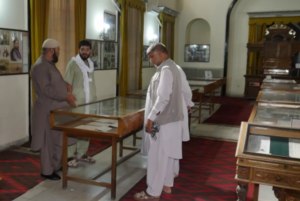 Meanwhile, some visitors said the government should do more to protect ancient works and monuments.
Meanwhile, some visitors said the government should do more to protect ancient works and monuments.
Officials of the National Museum of Afghanistan said that dozens of citizens of the country visit the place every day.
Copies of manuscripts decorated with gold and lapis lazuli, historical documents, Shah Abdul Rahman Khan’s wardrobe, desks, and chairs, attract the attention of every newcomer.
“The documents that are kept here are decrees, the decrees of kings on different dates on different subjects, which are the original decrees; fortunately, they have been kept in the National Museum from that time until now,” said Humayoon Nekzad, head of the document section in the National Museum.
The National Museum building was constructed 130 years ago by Amir Abdul Rahman Khan as a guest house for his son Amir Habibullah Khan, and the place was made into the National Museum in the period of Mohammad Daoud Khan in 1352.
“We expect the same from information and culture, maybe we have suggested that they cooperate for our wealth, and also our compatriots — whoever has an ancient work, they should bring something they have to the museum for the sake of the richness of the Museum,” said Mohammad Haroon, an official of the National Museum.
Meanwhile, some visitors said the government should do more to protect ancient works and monuments.
“They should do more development, work more on the National Museum, and introduce everything to the people, we already went to the museum, I don’t know why they didn’t allow us to enter,” said Farhad, a visitor.
“We want to see the historical places that we don’t know about because all the things are here, but unfortunately there are good things here and the things we wanted to see in the National Museum, and nobody allows us to visit,” said Naqibullah, a visitor.
Based on the statistics of the officials of the National Museum of Afghanistan, more than 100,000 historical documents and historical pictures from various governments of the country, 9,000 manuscripts, and nearly 20 tables, chairs, and cupboards of Afghan kings are stored at the museum.
Well-Known Afghan Comedian Dies at Age 67
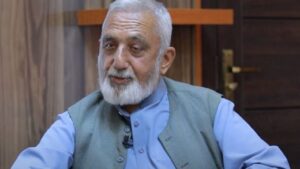 Khaksar completed his studies in Shir Khan High School in Kunduz and then joined the teacher training institute in 1357.
Khaksar completed his studies in Shir Khan High School in Kunduz and then joined the teacher training institute in 1357.
Khaksar died at age 67 due to lung disease in Ibn-e-Sina hospital.
He worked for more than 40 years in theater and cinema. Relatives of Khaksar called his death a tragedy for Afghanistan’s culture and cinema.
He was born in 1334 (solar year) in Khanabad district of Kunduz province.
“He was struggling with pain in his feet. Later, he got lung disease. He couldn’t breathe. We brought him to a private hospital but they denied us,” said Sorosh Ahmad, son of Abdul Ahmad Khaksar.
Khaksar completed his studies in Shir Khan High School in Kunduz and then joined the teacher training institute in 1357.
“Unfortunately, Khaksar has left us and he has gone. This is a big tragedy,” said Abdul Manan Hamidi, a comedian.
“Khaksar Sahib had a lot of achievements. Both in theater and movies… he has played in many TV spots,” said Mir Ahmad Qaderi, a comedian.
He started his work in 1361 with the RTA for the first time.
Khaksar worked in many TV programs, shows and movies. One of his movies, named “Mirak” has become popular among the Afghan people.
“His TV achievements are countless because he recorded many comedy pieces,” said Abdul Sahibzada, a comedian.
Khaksar was buried in Shah Shaheed in Kabul.
30% of Booksellers Have Stopped Business
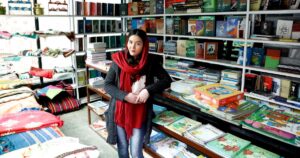 TOLOnews interviewed several booksellers and also expressed concern that book reading culture has faded.
TOLOnews interviewed several booksellers and also expressed concern that book reading culture has faded.
The commission to assess the Problems of Booksellers said that at least 30 percent of booksellers have stopped their business due to lack of a good market.
Abdul Wodod Mukhtarzada, a member of the commission, told TOLOnews that the booksellers are also complaining about high taxes which are difficult to pay as their business has dropped.
“We used to sell more than 500 books and we had 200 librarians here but I can say now that their number has dropped significantly,” he said.
TOLOnews interviewed several booksellers and also expressed concern that book reading culture has faded.
“There are issues because of the lack of female students’ presence in the universities. This issue also affects the book business,” said Sharifullah, a bookseller.
“You know that the market is down and the people lack the capacity to purchase books. Also there are many types of taxes and the Kabul municipality sends their representatives,” said Mansour Qazizada, a bookseller.
Meanwhile, the Ministry of Information and Culture said that efforts are underway to pardon the taxes of the libraries as a move to support the book markets in the country.
“We are trying to waive taxes on books and thus we can implement a tradition of book reading. We have held various exhibitions,” said Mahajar Farahi, deputy minister of Information and Culture for publications.
Behzad Art Gallery in Herat Reopens Today
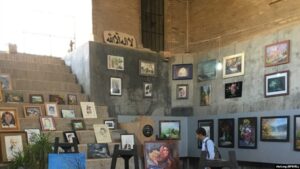 The Behzad Gallery is located in Haoz-e-Malik, one of Herat’s historical areas.
The Behzad Gallery is located in Haoz-e-Malik, one of Herat’s historical areas.
The head of the Behzad Gallery in Herat, Mohammad Ibrahim Habibi, told TOLOnews that the gallery that was barricaded on Tuesday by armed employees of Herat’s Department of Vice and Virtue, reopened today.
Habibi said that the gallery was blocked because two little girls were learning there, and the department of Vice and Virtue said that teaching girls and face-painting should be avoided.
“A Mawlawi from the Department of Virtue and Vice came and opened the gallery. But he said that you have disobeyed, and the disobedience is you educated the girls,” he said.
Herat Department of Vice and Virtue said that Behzad’s Gallery was not blocked by employees of the department.
Some female students in Herat who have been forbidden by the Department of Vice and Virtue from visiting the Behzad Art Gallery and studying art, urged the Islamic Emirate to reopen educational institutions for girls.
“I hope that the gallery would one day reopen for us, but the news of its closure made me sad,” said Bahar Akbari, a student at the gallery.
“After the closure of the universities, we came here. We were working here and learning art, but it has been eight months since they closed gallery for us,” said Elaha Ataee, a student of the Gallery.
Meanwhile, students asked officials to support the development of art and artists.
“Yesterday’s incident was very unfortunate for us, and we were afraid that this course would be closed,” said Mohammad Daud Ibrahimi, an artist.
“We ask the Department of Virtue and Vice to reopen the course to girls,” said Sadiq Habibi, an artist.
The Behzad Gallery is located in Haoz-e-Malik, one of Herat’s historical areas.
In the Behzad Gallery, art instructors instruct students in painting and miniature painting.
There is also an exhibition of artistic pieces in this gallery, and visitors stop by every day to view these works
The new procedure of the Ministry of Information and Culture for YouTube users.
 Mohajer Farahi, Deputy Minister of Publications of the Ministry of Information and Culture said that the Ministry of Information and Culture has prepared a procedure to prevent disorder and chaos in the work of YouTubers.
Mohajer Farahi, Deputy Minister of Publications of the Ministry of Information and Culture said that the Ministry of Information and Culture has prepared a procedure to prevent disorder and chaos in the work of YouTubers.
And in a conversation with the media, he said that this ministry has started the process of distributing work permits for YouTubers, and any person who wants to operate in this way must go to the Ministry of Information and Culture and obtain a permit.
Mr. Farahi says: “With this procedure, publications will become a standard, and publications that are against Islamic principles, against the customs and culture of our people, and against the interests of the country will be stopped.”
According to him, by implementing this procedure, non-professionals will also be prevented, and those who work on YouTube should at least graduate from journalism or have work experience in this field.
He says: “We will not allow anyone to operate without the permission of the ministry.”
Mr. Farahi also said that the Ministry of Information and Culture supervises all media and YouTube channels in the country. He said: “Anyone who acts against the principles will naturally be summoned and will be understood.”
Mr. Farahi added that no person or charity organization will be allowed to abuse the feelings of needy people or disrespect their dignity.
Farahi says: “The aim of the Ministry of this procedure is to use journalistic standards to convey the problems of the people to the government and also to convey the message of the system to the people. If people work, they can really play an essential role.”
Mr. Farahi said that the Islamic Emirate has the responsibility to make necessary reforms in the field of publications and how to present publications to the people in order to help them.
Noor Arjang; Afghan painter who wants to go to Northern Ireland for his portraits of Queen Elizabeth
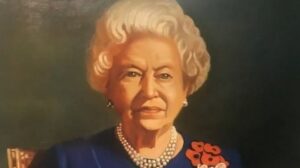 Dramatic paintings of the face of former British Queen Elizabeth II in a Kabul basement are an Afghan artist’s hope for a new life in Northern Ireland.
Dramatic paintings of the face of former British Queen Elizabeth II in a Kabul basement are an Afghan artist’s hope for a new life in Northern Ireland.
Noor Arjang escaped from Afghanistan under Taliban rule and is currently hiding in Pakistan.
But some of his artworks, including two portraits of the late Queen, have found their way to Belfast.
This artist’s painting has also attracted the attention of Angelina Jolie, a famous Hollywood actress, who bought two paintings for her gallery in the United States.
Since the Taliban took power in 2021, they have imposed several restrictions, including the playing of music in public. In the meantime, women have borne the brunt of restrictions in the field of education, social life and clothing
The second Damborah Salsal festival in Sweden; "Resonance no to the art of Taliban"
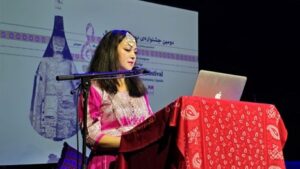 The second Salsal festival was held on Saturday, 4th of Sambla in Uppsala, Sweden by “Salsal Union”. tambourine artists from several European countries participated in this festival.
The second Salsal festival was held on Saturday, 4th of Sambla in Uppsala, Sweden by “Salsal Union”. tambourine artists from several European countries participated in this festival.
Salsal Union of Sweden/Sweden is one of the immigrant associations that has had significant activities in the field of Afghan art and literature and Persian language in these years.
Holding the Dambora Festival at a time when the sound of Dambora and the sound of music in Afghanistan is banned and blocked by the Taliban government, shows the efforts of this union and all the people of Afghan culture and art to keep music alive and current in Afghanistan. An effort that this community also considers as their duty in the world of immigration. As Ali Rezaei, director of Salsal Union, considers the biggest goal of this festival to be “to protect native culture and art and mother tongue in the world of migration”.
Mohammad Sharif Saeedi, a well-known poet and the secretary of Damboreh Festival, highlighted the same goals at the opening of the festival. While talking about the importance and place of music in the culture of human societies, he said: “There is a direct relationship between the progress and development of societies and the respect and prevalence of music in them. He said that in these days when music is stopped in our country and musical instruments are broken and burned, it shows the regression of society under medieval rule and the beginning of a dangerous trend. In another part of his speech, Saeedi considered “the gentleness and softness in the voice and melodies of Damboura as an antidote against the violence of the Taliban regime and said that holding such festivals is part of the struggle of Afghan culturalists and artists against the domination of this group.”
Subscribe Now
Don’t miss our future updates! Get Subscribed Today!
© 2023 White Assembly. All Rights Reserved.
